Disneyland was a good place to check out the diversity of the game industry. I attended the Casual Connect game conference last week at the Disneyland Hotel in Anaheim, California. The event had a whole track dedicated to diversity issues in partnership with groups that included United in Diversity, Leadership for Diversity, and Contagious Creativity.
The sessions were lightly attended, but I thought they were loaded with powerful and moving messages for the leaders of game companies. The gaming, tech, and film industries have had huge wake-up calls on the issue of sexual harassment in recent months, but the main diversity panel argued that corporations need to address the root causes of the problem with authentic and creative leadership. The panel focused on how to transform a company’s culture from within to be more inclusive.
The panel was moderated by Nicole Lazzaro, CEO of XEO Design, and it included former Microsoft Game Studios head Ed Fries; Jon Ramer, CEO of Compassion Games; Carrie Dieterle, chief people officer at Insomniac Games; Rob Peloquin, agency director at Nielsen; and Megan Gaiser, principal of Contagious Creativity. Elizabeth Olson, PR consultant, served as the emcee for the diversity track.
Here’s an edited transcript of the panel.
Nicole Lazzaro: Leading for diversity is an inside job. It’s becoming aware of our inner selves, because that’s where leadership starts. How many people have known someone that’s in transition between male and female, or Muslim to Catholic, or Orthodox to atheist? We’re all in transition, in a sense, as leaders. We’re always in transition from the leaders we were to the leaders we want to be. I’m honored to share the stage with five leaders dedicated to transforming the people and the culture around them to be more inclusive.
We all have unconscious bias. As good as any of us are in this room, we all have these unconscious biases. These are the enemies of diversity and inclusion. Today we’ll share some of our stories of identifying and working with unconscious bias to create cultures and results that are more diverse and inclusive.
We have Jon Ramer from Compassion Games, who is leading, around the world, an effort to make the world a more compassionate place. We have Carrie Dieterle from Insomniac Games. She’s a head of HR there. Ed Fries from, formerly, Microsoft, and now working with the IGDA Leadership Foundation. And we have Robert Peloquin from Nielsen, who’s going to talk to us about how Nielsen is creating a diverse culture.
For the panelists, if you could each share for a moment — what makes you so passionate about being on this panel today?
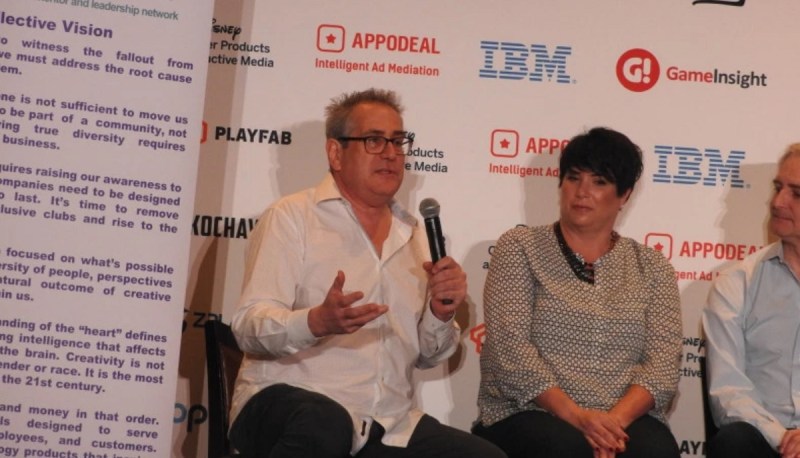
Above: Diversity panelists Jon Ramer and Carrie Dieterle.
Carrie Dieterle: We were having breakfast this morning, and this group had not met yet, but we were starting to share some stories. In preparation for this panel, I was really thinking about why I’m so passionate that we are treating one another as human beings, with kindness and respect. It goes back to before I had a career in HR. My family owned a business. It dealt with the public. I joked with the group — or not joked — I was 30 years younger and 30 pounds lighter, and yet my uncle, who was part of the business, didn’t think I was attractive enough to be in front of customers.
That stuck with me for the rest of my life, because he didn’t judge me on my capabilities. He looked at what his ideal was, in terms of my physicality, and that was going to dictate my role in my family’s business. I think that even from that beginning, I realized that I wanted to do things differently, and I would never look at anyone based on their appearance and make that judgment. That inclusivity has stuck with me through my career.
Jon Ramer: I woke up today and I realized that I’d never been in a world like this. I mentioned to you, in the news — Laurence Fink, from Blackrock — if you haven’t seen this yet you will, sending a message out to all the companies that Blackrock invests in, that making money is no longer enough for business. Business has to take responsibility.
We’re in a new world. I feel like we’re in the middle of a cultural earthquake. How men and women relate to each other, how we deal with diversity in a different way, how we celebrate our difference. The Chinese say that if we don’t change our direction, we’re likely to wind up where we’re heading. For myself I remember—there was a person I hired years ago, and I remembered she came for the interview with a see-through blouse on. I was thinking, my God, is this why I hired women all these years ago? No longer is it okay to operate in this kind of ignorant space.
Talking for myself, I’m grateful for the fact that we have such a topic at a conference like this. But then, when you see how many people show up, it’s a tough subject. How do we make these choices and recognize that our choices really do matter, and have an impact on people’s lives? I’m here as part of a conversation I think all of us are in. It’s a blessing. I thought I would be here one day, but until yesterday I didn’t know it would be here today. I’m grateful for the fact that this is happening and that I’m with a remarkable group of folks that I want you to get to know better, who’ve been in leadership positions.
One of the things we recognize is that leadership isn’t just C-level leadership. We’re talking about leadership from within. I’ve been fortunate, working with indigenous population, where they say that authenticity grants authority. The guiding principles in all the work we’ve done with Compassion Games is that, starting from within, working in a circle, in a sacred manner, we heal and develop ourselves, our relationships, and the world.
We need a new world, especially for future generations looking to us, who have the influence and authority to make choices. We need to think differently about how we relate to each other. I’m humbled by the fact that we see these changes happening right now.
Ed Fries: Listening to you talk reminds me that I’m optimistic about the progress we’re making. I’ll maybe talk later about my mom and the influence she had on me, but in response to what you’re saying — I just feel like we’re making progress. Games are getting better. They’re reaching out to a more diverse group of people. I think some of the negative stuff we’re seeing is a reaction to the progress we’re making. Some of what we’ve seen in the last election is a reaction to the progress we were making so quickly.
You see that same thing in games. Games are getting many more diverse characters, and so we get the natural pushback of Gamergate and things like that. But that just shows we’re headed in the right direction. I’m optimistic about where we’re going.
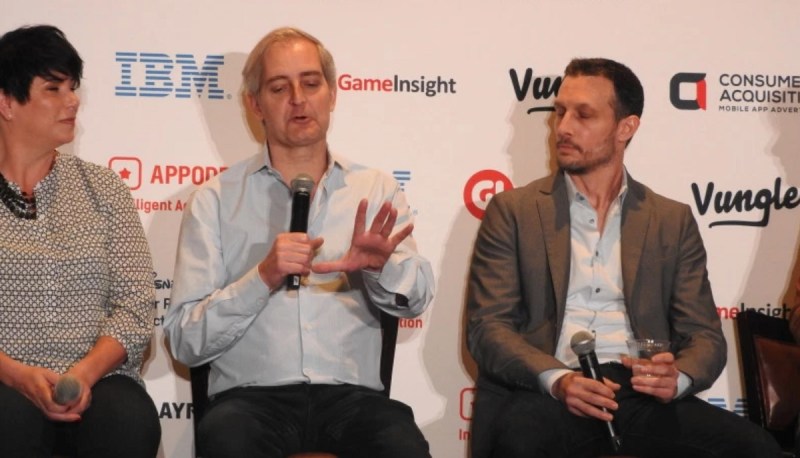
Above: (Left to right) Carrie Dieterle, Ed Fries, and Rob Peloquin.
Robert Peloquin: I think I’m passionate about this topic because of how my attitudes have changed. Growing up in a small town, and then moving out and traveling the world, I saw my attitudes completely change as far as the way I saw the world.
I think we all live in a bubble. Some of us have a small bubble and some of have a giant bubble and some of us are medium-sized. I noticed that the bigger my bubble got, the more diverse my bubble got, I felt like I became a better person, a more empathetic and happier person. I’m really passionate about this. Nielsen has done a lot to show how much diversity can affect a company and organization.
To your point about leadership, I really think it is, whether you’re C-level or just an employee who’s not managing anybody, everyone can lead. Everyone you speak to, how you treat people, that can have profound effects. To Carrie’s point, a conversation 30 years ago can still be significant now.
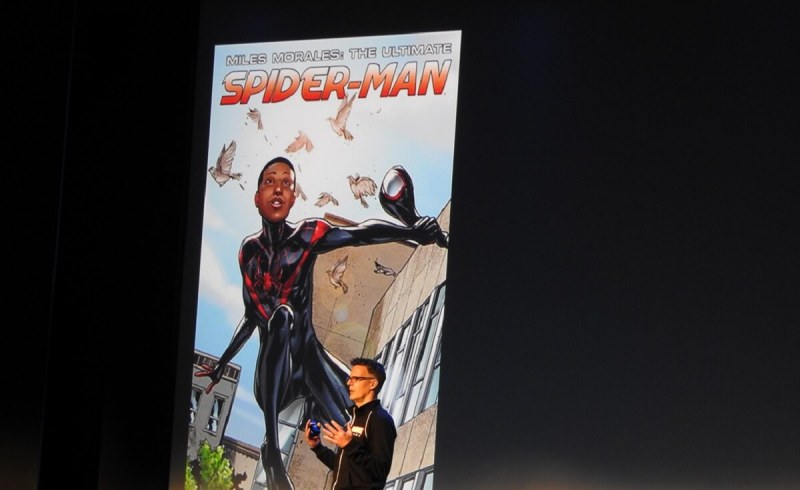
Above: Bill Rosemann shows one of the diverse reimaginings of Spider-Man.
Lazzaro: I’d like the panel, and the audience as well, imagine you have a young friend who’s just started doing something similar to you, maybe in another organization. What kinds of tips, books, resources would you recommend to them to lead from a more diverse perspective, something different from the old way of leading?
Dieterle: We’ve been going through something that Insomniac, really trying to focus on our leadership and how we can effect positive change. One of the tips that’s resonated with everyone is, give people the benefit of the doubt. When we all meet for the first time, we have unconscious bias. No matter who you are, you’re going to make a snap judgment based on the person in front of you. You have no idea who that person is. So even when you’re interacting in business, give the other person the benefit of the doubt. If you listen, if you are compassionate, you might actually learn something.
Ramer: There’s a notion that you should seek to understand before being understood. That’s where part of the difference shows up — being present to what’s being said and who you’re with. Being able to calm yourself enough to listen to what you’re hearing and appreciate what people are saying. And letting them know that they’ve been heard. That’s the most critical thing.
Fries: When I meet with younger managers, I often say that the most important thing you do is hiring. The things you do well in hiring, or the mistakes you make in hiring, you live with them for years to come. And so hiring is critical. It’s easy, when you’re trying to fill a position, to be impatient. You see a candidate and you know they’re not meeting your bar. You meet another one and another one, and after a while the bar starts to drift down. Maybe it’s me? Maybe I’m too picky?
Especially when you’re talking about diversity, you’re trying to create this balance within your team. Not only do you want a great whatever, but you want someone who will help fill out the balance of your team. You have to be patient. When you find that great candidate, they stand out. That’s what I remind myself. Wait until you’re stunned by a candidate, and then you know you have the right person.
Dieterle: I often hear that someone’s not a fit, not a cultural fit. When I hear that I stop people right then and say, “That’s exactly the person you need to hire.” We sit here and we build an infrastructure of sameness. If you can understand — from a cultural standpoint within an organization, you change with every person that enters your company and every person that leaves your company. You become more diverse and more open to ideas if someone isn’t a cultural fit.
Fries: I just read this big study from Carnegie Mellon. They’ve done a great job bringing up the diversity of their computer science program over the last decade. What was interesting about that, they said that specifically they did not focus on gender. They focused on culture, changing the culture of their computer science community. They didn’t use the word “diversity.” They used the word “balance.” I love that. They went to a more accepting culture.
An example of what they did is they found that if they offered computer science along with biology, they would get a different set of students applying, because they had people who just wanted to do computer stuff for its own sake, but there were also people who wanted to apply computers to something that was interesting to them. That led them to reach a broader group of people.
What struck me when I read this — they said they specifically didn’t focus on gender so much as culture. It reminded me of the early days of the games business, where we said, “Well, we need to make games for girls, so we’ll make all these very pink games.” But why I said I feel optimistic, why I think we’ve made progress — now I feel like we can make games for everyone. Something like Overwatch is a game that has characters that anybody can relate to. You can find someone there that fits. Or even just something like Candy Crush. Can we make games that work for everyone?
Look at the latest Star Wars. The cast is diverse, but is that the story, that they have a diverse cast? No, it’s just a great piece of entertainment. I bet if you look at the people who made it, that was a diverse group as well.

Above: You have a lot of big guns in Sunset Overdrive.
Lazzaro: I love the idea of focusing on culture, but how do you break that down, so it’s not just — all right, we have the culture check box? What steps do we take? How can we operationalize this?
Dieterle: I’ll talk a bit about Sunset Overdrive. That was a really interesting opportunity, where we made a conscious decision that you get to choose. You get to choose your body type. You get to choose your race. You get to choose what you wear.
When you talk about how you effect change, what I would say to you in your businesses, you want to be able to speak up. It’s a challenge. Right now we’re working on a different game, and those same questions come up, but I would say we as a gaming community have an opportunity to build that diversity into what we’re doing based on the people we’re listening to.
Peloquin: The advice I would give is, number one, be open to change. Looking back on our views, understanding our own biases — just understanding the human mind, I think. I had some conversations with friends of mine back east, very smart people — one’s retired at 40-something, one’s a lawyer. They insist that they’re not biased. I just look at them and think — we don’t know how truly imperfect we are. Just simple things, like judging people by the way we look. There are studies showing that if you have a tie or suit on, you get rated differently compared to another outfit. So be open to change.
Talking about books, since you mentioned, there’s a great book by Adam Grant called Give and Take. It really dispels the attitude that nice guys finish last. There’s a lot of research out there showing that you can do the right thing, be a good person, and still be successful, whether it’s in school or business or sports. That’s some of the advice I would give initially.
We had an executive speak at Nielsen and it really resonated with me. He said, “The whole five-year plan is great, but realize that in five years you may be doing something you had no idea you wanted to do.” Five years ago I didn’t think I’d launch a video app. I never thought that would happen. So be open to change, be open to possibility. Listen to others and think. You don’t necessarily have to agree, but understand where they’re coming from.
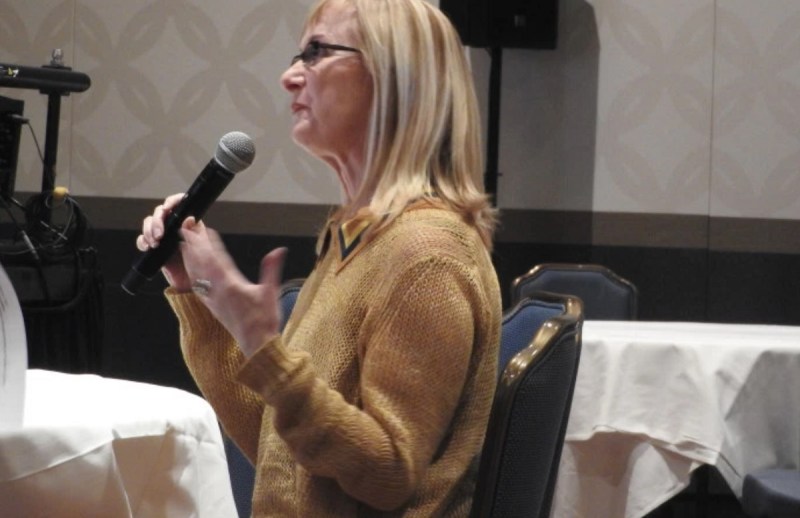
Above: Megan Gaiser of Contagious Creativity.
Ramer: I wanted to talk about how games can change culture. We have the good fortune. 18 million people saw our video about the “compassion games” that were played in prison. They set up 11 days. Some of the leaders, gang leaders within the prison, they identified themselves as ambassadors — “compassionistas,” they called themselves — and the game was to count the number of acts of kindness they could do in this 11-day period. For the first time ever, they went 11 days without an act of violence.
This idea was written up in a master’s thesis someone did about the impact of how culture can change in the context like that. When the game became, how do you treat each other more kindly, treat each other with respect and dignity, all of a sudden people wanted to win. That desire to win is still present, but winning meant doing better and better. They’ve taken that concept and brought it into schools, some rough schools in Los Angeles, and it’s had the same effect.
I don’t think the power of games is trivial. I know everybody here knows that, but the way that games can be used to impact cultural change — that’s one of the opportunities we have within us. Recognizing that we can take change from the game world out into the real world. But I encourage you to look at that video and the story that’s associated with it. Here’s an environment where you would not think you could create a situation where people would treat each other with kindness, but they did.
Peloquin: I saw that and it really resonated with me. I’m a big believer in, if it’s broke, fix it. If it’s not broke, don’t. If you look at our criminal justice system….
Lazzaro: Isn’t using the word “criminal” biasing ourselves anyway?
Peloquin: Exactly. But that really resonated, because what we’re doing just isn’t working. We have 80 percent of people going back to jail. At what point is society responsible? Seeing how effective that approach could be — that’s how we met. I sent him a note about how I loved what those guys are doing, and we were looking to do some work together and create other games.
Lazzaro: Can you talk about that process?
Peloquin: We’re kind of figuring that out? But it’s a multi-screen video chat app designed to bring people together and facilitate more face to face conversations. One of my big concerns — at breakfast we were talking about this. I have a cousin, 20-something years old, who’s adamant that texting and Facebook is the best way to debate. It was mind-boggling to me that anyone could think that. When you speak to someone you can perceive emotion. You can articulate what you’re trying to say.
Lazzaro: Through video you can experience a bit of their internal state?
Peloquin: Yeah, exactly.
Fries: And maybe we just don’t understand. Our generation just doesn’t understand how to communicate that way. Over Christmas I was talking to my brother’s kids, and they were explaining to me why it was bad to put a period in my text message. All the emotion and attention that’s tied up in that period — if you put it there you have to know what it means, know what you’re saying. A lot of that stuff is just communicated a different way now.
Lazzaro: Our next question is about overcoming unconscious bias. How would you say you’ve overcome unconscious bias in what you do?
Peloquin: First, it’s educating yourself. As you said, there’s a lot of great research out there. I love reading research. I love books. I’m passionate about social behavior. I’m fascinated by what makes different people look at things different ways. There’s a great image out there with a six and a nine. Two people look at the same thing and see something different.
Lazzaro: You mentioned you were overseas. Tell us about that.
Peloquin: Traveling really opened my eyes. Going to Egypt and Jordan — I flipped a car in Jordan, in the middle of nowhere, in fog. Out of nowhere a brick wall came right at us and we had a driver that wasn’t paying attention. Thank God we’re all alive. After that we were treated — people invited us to their homes. People fed us. The kindness that was displayed — in Egypt I was invited into how many homes I don’t know, for no reason.
That opened my mind to seeing how I view certain people, Muslims for example. Prior to that, the news post-9/11 was my experience. I look at my friends in small towns who haven’t had that experience. You almost can’t blame them for not feeling the same way. They’re not going to feel the same way I do without that experience. It goes back to that bubble — the larger that bubble gets, the more diverse it gets, the more empathetic you become.
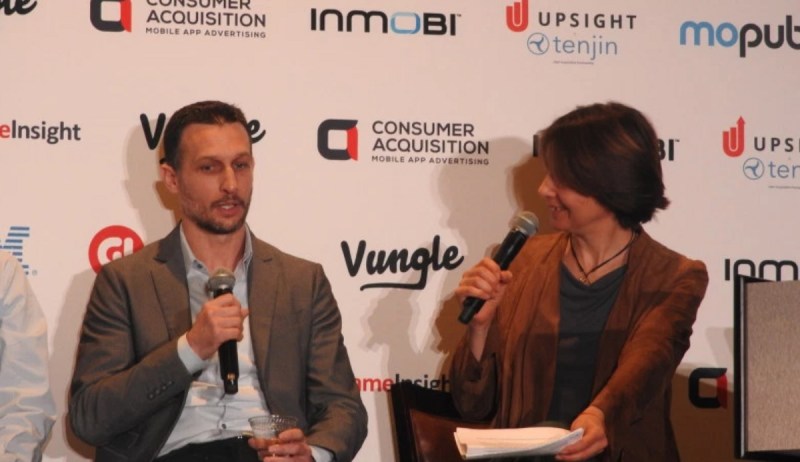
Above: Rob Peloguin and Nicole Lazzaro on diversity panel at Casual Connect.
Lazzaro: How do you take that back to your job?
Peloquin: I’m fortunate that at Nielsen, we’re recognized as a top diverse company year in and year out. I’m blessed to work with some great people who see the world the same way. I haven’t had to change them as much. My whole philosophy in life is to treat other human beings the way I would want to be treated. I think it’s that simple.
By the way, the king of Jordan is a big supporter of the games business. They have programs in Jordan to promote game development. I spoke at a conference there last year that was more than half women. It’s great.
Fries: For me, just trying to understand that every group has a culture, whether you realize it or not. I guess at first I didn’t realize we had a culture. When I was working on Excel as a programmer, something like that, we were all pretty much exactly the same. Over a period of five years, all of a sudden there were 55 young white programmers working on this project, starting from just seven. That was our culture. It was all we knew.
I remember one time, I interviewed a fantastic woman programmer. I wanted to hire her. She was so great. And she looked around and saw 55 guys and said, “No, thank you.” She went to a different group. Your culture defines who you will and won’t get.
Lazzaro: As part of the IGDA, what are you doing to help change those cultures?
Fries: The IGDA Foundation has grown tremendously over the last three years. We have funding from Intel, from Microsoft and others. The Bigglesworth Foundation is another great group. We bring diverse candidates to game conferences all around the world, people who couldn’t otherwise afford to come. We set up mentorship programs to them. We’re doing a diversity speaker program now, where we’ll pay to fly diverse speakers to conferences. We’re trying to set up a pipeline of diverse candidates for companies that are looking for them.
On unconscious bias — how do you know you have it until you run into it, right? For me, the big thing was, after five years at the company, I moved from Excel to Word. At Word there had been a woman manager who really made an effort to create a diverse community of programmers. I came from 55 programmers who were exactly the same to a group that was diverse in age, in gender, in everything else. It was a completely different feel. For me, that was an eye-opener.
Ramer: I just want to speak to the terror of unconscious bias, because it speaks to what we don’t even know we don’t know. The idea of compassion often — it’s not just empathy in action for others, but we need compassion for ourselves. I don’t know how else I’m going to make change except to find a safe enough place to realize I’m perfectly imperfect. If we have enough trust between us, I’m willing to hear about my unconscious bias.
I can feel diminished by that idea, because I’m afraid. I don’t know what I don’t know, and I don’t want to be exposed. We were joking today — I remember when there were smoking sections on airplanes, and everyone just went along with that. We look back now and think, what were we thinking? I wonder what we’ll look back on now as far as what we were thinking in 2018, how insensitive we were. Part of this change has to start from within.

Above: Compassion Games are about who can do the most acts of kindness.
Lazzaro: You did this great game with prison culture, a very different culture from outside. How did you get people to uncover unconscious bias? How did you work for them?
Ramer: There was a woman who was named Evil. She changed her name to Tinkerbell, and still kept that after the games. [laughter] It was amazing to be in the presence of this. But when you take away everything that we need to survive, everything that’s left is culture.
Dieterle: As we were asking this question, thinking about how to apply this — brutal honesty is one of the things that I really appreciate. When we talk about unconscious bias, talking about the environment you’re in, there are two things, two stories or thoughts that come to me. We’ve had a lot going on with the #MeToo movement. It’s huge, when you hear how women feel in the workplace, that they’re afraid to come forward. But it’s how you actually lead.
For us, or for me, we get a lot of questions from people as articles started coming out in the New York Times. They were hearing about confidentiality agreements, and how people are being paid hush money. We have things called AMAs, Ask Me Anything, like on Reddit. We allow people to ask questions as individuals or send them anonymously, and people ask how Insomniac handles sexual harassment.
That’s huge, but it gave me the opportunity to talk about the fact that we have not experienced that to a great degree, because of how we are transparent in our organization, how we encourage people to speak up. We talk about trust and respect and how you need to have compassion for the people you’re working with. Our whole thing is a hashtag of #NotHere. We want people to know that it’s not okay, and we want to hold people — men, women, genderfluid — accountable for treating people the right way.
You don’t always know. When I came to Insomniac Games, if we had a happy hour, I hired the young, pretty bartenders, right? I wanted pretty girls at the bar for the mostly male employees. Would I do that today? I wouldn’t do that today because I’ve learned and grown and evolved. We’re trying to actively change the culture within the games industry itself. I’m getting a little off-topic on unconscious bias, but I feel like it’s about how we interact with one another, every day, that changes things.
Lazzaro: You talked about culture and how you were changing the culture at Insomniac.
Dieterle: We’re participating in this really cool project right now. It’s in its beta phase, but it’s called “Pro Habits.” You can pick a track — pro innovation, pro empowerment, pro leadership, whatever it may be — and you as an individual try, over 20 days, to commit to make a change in your behavior through habits.
I chose pro leadership, and I shared with this group — because I think it’s really relevant to leadership for diversity — that yesterday my micro-activity was to commit to lead with love. What that meant was, I needed to express gratitude to someone within my team, or someone within the company, for something they have done. Lead from a more human, a more heart-centered place.
That’s how we start making a cultural shift. The cool thing is, this app has a leader board. You get to see and share and follow what people are doing. There’s a gamification to it. People get excited about it. You build this enthusiasm, and all of a sudden you notice that these positive habits are coming into your workplace and changing people.
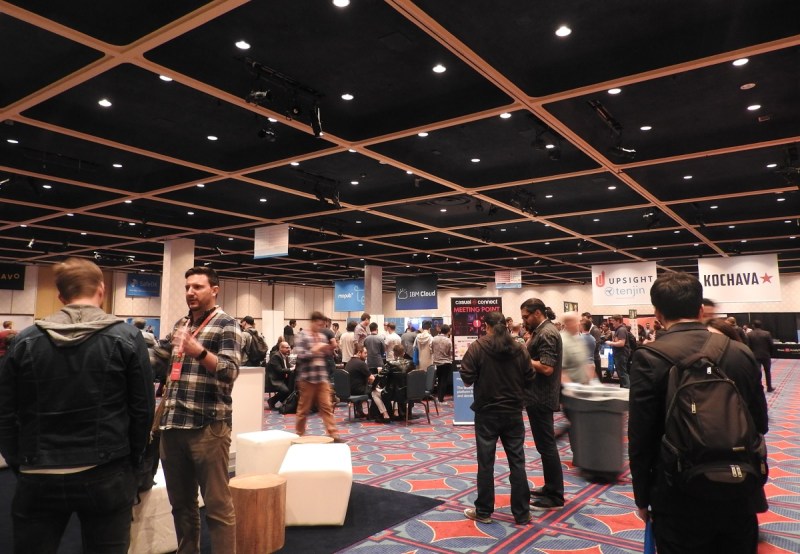
Above: The crowd at Casual Connect USA 2018.
Lazzaro: What strikes me as interesting about that — there’s a lot of talks that have been given by myself and others about gamification in the workplace. But just having the presence of a game or game elements brings it into prominence in terms of the importance of that for your organization. You’re giving language and ways of thinking in terms of leadership. How do we talk about this? We’re identifying that this is an important value, that is an important value. You’re walking the talk.
You have your mission statements, but if those then become cultural goals, if you create activities around them specifically, or the language of these things is reflected in your mission statement, that really brings it full circle. That way you’re actually — it seems to me that you’re actually changing the culture.
Dieterle: You’re not just leading by example. You’re living by example. It’s becoming a better you.
Peloquin: It’s important to see similarities. It’s easy — the way the mind works, we’re naturally lazy. It’s easier to see the differences in someone than to get to know someone. You find that a lot of people, though, regardless of the differences between us, we have a lot of similarities. I have a friend in a little Nubian island in Egypt, the middle of nowhere. We probably have as different a life as you can have. But when I met him we just hit it off. We found so many similarities – our passion for our families, our kindness, food, so many things. We talk every week on Facetime from Egypt. He sends me coffee. He’s a very special person. He changed the way I see the world.
If you just look at the similarities we have, you find that most of us as human beings, we want to provide for our families. We want to have a good life. We have some differences, and we just have to respect those.
Ramer: My favorite rule of thumb about this thing is to connect through our similarity and innovate through our diversity. The difference becomes a source of strength. When you have the right context in which you’re willing to be called out when maybe you have some of those biases, you also have an environment in which you can respect those differences. Differences not just in the way look, but in the way we think, in the way we make choices, in our priorities.
That’s really the moment — when you say, let’s rank these things according to what’s most important, that’s where politics shows up, the question of who has a voice. It’s the abuse of power. I think we’re getting at how we need a different kind of culture.
Again, from the indigenous world, there’s this idea of co-creative, situational leadership. Even though my power is in my job title, there are moments when you know better than I do. I need to have enough of what it takes to say, hey, this is where you should be making the decisions.
Dieterle: If you are in a leadership position, recognize the fact that you are potentially — I would say I have a strong sense of self. I tend to be very assertive. But in my role, that means I can sometimes be intimidating. I need to take a step back and understand the impact or the power that my title or my role may have. I need to be more humble. I need to let my defenses down. I need to be sure that someone sees me as a human being, so that we can create together.
Fries: It’s a power to both create and destroy. You can make someone feel really happy by just noticing their work and complimenting them, mentioning them. You have to use that power carefully.
Lazzaro: A number of women in the game industry, we woke up because we were getting death threats and stuff online. We realized that our leaders, the people we had traditionally looked to for leadership, weren’t, in this particular situation, really leading. There was no help that was going to come. We were the help that was coming.
We came up with this idea that we wanted to essentially model the behavior. As a leader you become a model for the behavior you want to see. We wanted to open opportunities to other folks. We also wanted to put a spotlight on success, on feedback. If we as leaders did those things in those very dark times, that’s all we really needed to do. Moment by moment, person by person, attack and response, we have made and weathered those changes.
The women and the men, as allies, that were part of all of this are not the same anymore. They’re so full of confidence and joy and self-determination. The world is changing, but we’re also becoming more human. It’s a process of revealing our inner selves and becoming more genuine.
Audience: What are your thoughts on — when those initiatives were announced by Intel about trying to build a more diverse field in the game industry, one of the groups that I felt was left out was the disabled community. I’m executive director and founder of the Able Gamers charity, and one thing we’ve found that, as with all diversity, you get better end products when they’re built by diverse groups of people. But people with disabilities have been left out of this conversation. Intel spent $115 million toward this initiative and left disability off the table. I know several gamers with disabilities who’ve left the industry because games just aren’t willing to support their differences.
Lazzaro: There’s a really interesting quick analogy, and then I’ll hand it over to the panel. I do VR games. I have a company, XEODesign, that’s been running for 25 years, and I’m working on a game called Follow the White Rabbit. I go to these VR meetups all the time, and I was meeting this guy — I’ll call him Mike. He was a great guy. He was in a chair. He had a big bushy beard, this cool steampunk hat, a lot of VR equipment with him, and as we got to talking, what he said to me was, “You know the reason why I have this big bushy beard and a hat and all this equipment people can try? When I’m in a chair, I’m invisible.” That was interesting.
An hour later I was talking to some other folks, and we were starting to form a little circle, and then literally a guy walked right in front of Mike, closed the circle, and Mike was on the outside. Okay, I’m aware of that unconscious bias now, and so I opened the circle to let Mike in. It isn’t unless we as leaders take that position of recognizing what it is we want, that we want that inclusion, that things will ever change.
Fries: I just want to say really quickly that disabled people are one of the categories of people we support through the IGDA Foundation, which is partially funded for Intel. We need to get more clear about communicating that, but it is part of the groups we support.
Ramer: There was a TED talk I saw recently, where a woman was talking about a school in which nobody fails. Instead of getting the mark that you fail, it was called “Not yet.” We’re here talking about diversity, and the grade is “Not yet.” I’d like to believe the folks at Intel, if that was pointed out to them they would say, “What were we thinking? How could we be so unconscious?” Again to that unconscious bias issue. That’s part of the compassion in all of this. Of course, when we say diversity, it has to be inclusive. Our definition of inclusivity needs to be a moving target.
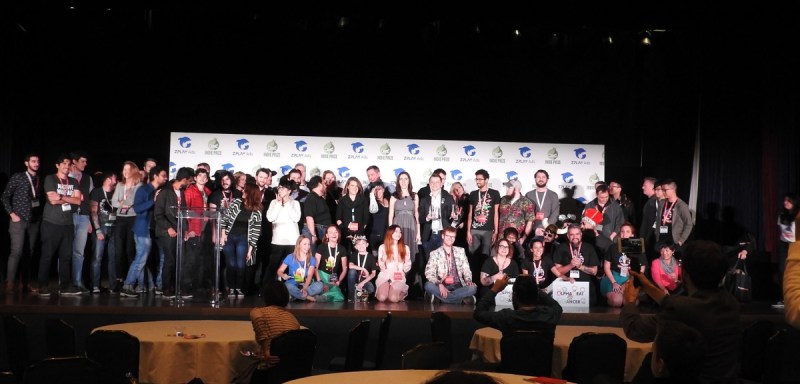
Above: Indie Prize Award contestants at Casual Connect USA 2018.
Megan Gaiser: I love a phrase that goes, “Earth is the school for slow learners.” God has a real sense of humor, in my opinion, because the funny thing about blind spots is we can see everyone else’s. We just can’t see our own. Which bodes well for the idea of a group, leadership for diversity, supporting each other to see those blind spots, as John said, to feel trust, so you can listen to constructive feedback and let it sink in. Then you can change your behavior.
My question would be — sometimes we’re not listening, not realizing what we’re doing. We have to hit a big failure before we can see that we have to do something different internally. Does anybody have something they’d like to share about that? How something happened that caused you to learn from a failure.
Ramer: The election, for me, was one of those moments. How could we do that? I’m from New York, and I had a pretty good feel for what was coming, but when all was said and done I thought, the only thing I could do was up my game. Get more conscious, be more respectful, and be more aware of the difference that it makes, that voting does matter.
That was, for me, like Pearl Harbor was for my dad’s generation. I think we’re all in that place. We’re in a new world. I know the phrase that Megan used, or one version of it: “Planet Earth is the place where the souls of slow learners are sent.” If that’s true, it kind of explains everything.
Fries: For some of these kinds of change, it takes a while, especially in a big company. For me, the fact that another programmer became a vice president was super important to be becoming a vice president, because I could see a path. There was a way to become a VP without having an MBA or being a marketing person, that kind of thing. Likewise, now, in my old group, Shannon Loftis the head of studios. How many women does that set a guide for? “I can become that someday.”
Lazzaro: Has failure made any of you a better leader?
Peloquin: I’ve had a lot of practice in failure. It’s a whole different talk. But I hate the word failure. I like to say that I’ve learned another way not to do something. What I’ve found is that if you take responsibility and own up to your actions, a lot of times you can resolve conflict. I’ve had cases where I blew up at a client, and it was maybe not my fault, but I was leading the team. If you take responsibility, apologize, and make sure it’s not going to happen again, people appreciate that. I think all the times I’ve made those mistakes, just owning up to it and taking responsibility is the key.
Ramer: When I was a kid I used to watch these movies of early attempts to fly. Guys jumping from heights with propellers and wings. I would laugh, but then I realized, at the time those were really serious attempts, before we understood the principles we needed to learn. I like to think one day we’ll look back at our efforts now and we’ll laugh in the same way. What were we thinking, until how we figured out how to live in a diverse way, how to treat each other with respect? That’s the kind of hope I bring to this conversation. Perhaps there’s something we don’t know that can make that difference.
Disclosure: The organizers of Casual Connect paid my way to Anaheim, California. Our coverage remains objective.

